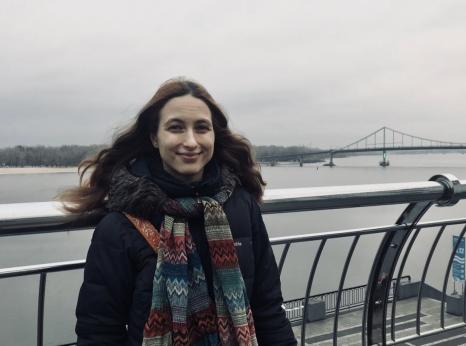Russia: Artist’s Pretrial Detention Extended Again

Aleksandra Skochilenko is a well-known songwriter and artist from St. Petersburg. She writes songs, creates comic books and cartoons, organises concerts and jam sessions. She also wrote “Book About Depression” which helped many people and contributed to destigmatizing mental illnesses. The book has become extremely popular and has been reprinted several times and translated into various languages. It also has inspired many videos and exhibitions.
Aleksandra Skochilenko is accused of replacing price tags in local supermarkets with anti-war information, including about those killed during the shelling of the Mariupol Drama Theatre. She has been charged with “public dissemination of deliberately false information about the use of the Armed Forces of the Russian Federation” under recently added Article 207.3(2) of the Criminal Code. She faces 5 to 10 years in prison if convicted.
On 11 April, police searched Aleksandra Skochilenko’s home and arrested and interrogated her until 3am the next morning. On 13 April, the Vasileostrovsky District Court placed her in pre-trial detention until 1 June 2022. Her pre-trial detention has been subsequently extended.
Aleksandra Skochilenko suffers from celiac disease and requires a special gluten-free diet. On 20 April it was reported that her health had deteriorated due to lack of access to adequate food. On 21 April her lawyer informed Amnesty International that the detention centre had finally allowed her to have a food parcel from her family that catered to her medical requirements.
However, on 23 April she was transferred from a temporary detention centre to a pre-trial detention centre and on 25 April one her lawyers visited her and reported that her health condition was getting worse, as she was not being provided with the diet she required or allowed food provided by her family. Aleksandra Skochilenko felt weak much of the time. She was also being subjected to psychological pressure from detention centre guards and her cellmates.
On 7 May, after information on Aleksandra Skochilenko’s treatment was published by media, she was transferred to a double cell with a cellmate who did not harass her.
On 8 June, Aleksandra Skochilenko was taken to a psychiatric hospital for an expert opinion on her mental health. She spent three weeks there even though an expert diagnosis usually takes one day and can be carried out in the pre-trial detention centre. During her stay there her health continued to deteriorate. Doctors refused to share medical information about Aleksandra Skochilenko with her partner on the grounds that she is not a close relative despite an official request made by Aleksandra Skochilenko to recognise her partner as such. The hospital also refused to share this information with Aleksandra Skochilenko’s lawyer. Aleksandra Skochilenko complained that she was experiencing severe pain in her chest and abdomen, but doctors failed to carry out any tests arguing staffing shortages.
On 28 June, Aleksandra Skochilenko was transferred back to the pre-trial detention centre. Her partner requested Aleksandra Skochilenko’s medical records again, but the authorities did not provide them. Aleksandra Skochilenko was once again denied the medical treatment she needed.
On 30 June, the Centre for Combating Extremism (Centre “E”, a police unit that specializes in monitoring and prosecuting political opposition and government’s critics) submitted a report claiming that Aleksandra Skochilenko is a member of a “radical protest feminist group” called the “Eighth Initiative Group”. Aleksandra Skochilenko claims that she has never heard of this group. The report was submitted to justify the prolonged detention of Aleksandra Skochilenko. However, she and her lawyers believe that this claim may be used against her later.
At the Pre-Trial Detention Centre, Aleksandra Skochilenko was being provided with gluten-free food at least once a day for lunch, but she was not able to eat breakfast or dinner. Aleksandra Skochilenko has already lost a lot of weight which puts her health at risk of further deterioration. In addition, the investigating team has declared her partner a witness in the criminal case, which means they are not allowed to see each other. Her partner has unsuccessfully filed several requests to be able to visit Aleksandra Skochilenko.
On 1 August, Aleksandra Skochilenko was transferred to a Temporary Detention Centre, a smaller facility, where she may face further issues to access the diet and medical care her condition requires.